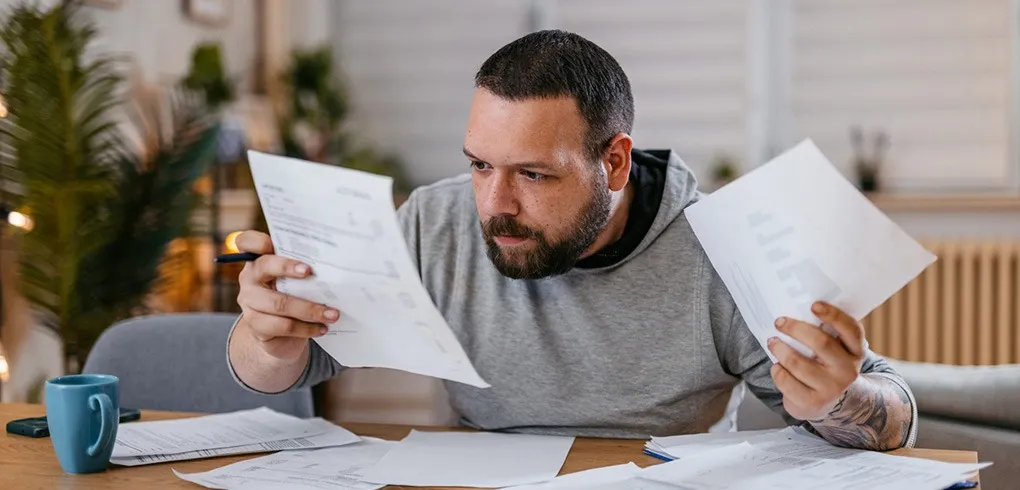When this happens, it’s important to understand why so that you can take steps to improve your chances of being approved for a mortgage the next time you apply. In this guide, we’ll discuss mortgage rejections and what you should do if your mortgage is declined after valuation.

Mortgage Declined After Valuation
Had a mortgage declined after valuation? Here we explain what a property valuation is, why a mortgage may be declined after valuation and what you can do.
speak to a mortgage advisor
Fill out this enquiry form and we’ll contact you to book a free call with one of our mortgage experts.
"*" indicates required fields
A mortgage application can be a complex process that’s often stressful for borrowers, especially if the loan is declined. This can occur after the valuation of the property, as the valuation may reveal some issues with the property that make it unsuitable security for the mortgage.
Contents
What Is a Property Valuation?
A property valuation is an important step when it comes to securing a mortgage. Performed by a qualified surveyor, the process involves assessing a property and its current market value. This can seem intimidating, but it’s instructed by the lender to ensure there are no significant problems with the property that would make it unsellable, it’s worth at least the minimum amount required to justify the loan requested and its suitable security.
When carrying out a valuation, a professional surveyor will typically take into account factors such as building condition, size and accessibility, location and current market value. Although a lender may use this information for risk management purposes, they’ll also use it to confirm how much they’re going to lend.
Some surveyors may physically visit the property, while others may carry out desktop – i.e. computerised – valuation. Desktop valuations are more commonly performed during the remortgage process.

What Is the Purpose of a Mortgage Valuation?
The purpose of a mortgage valuation is to provide the lender with an accurate picture of the value of the property they’re lending against. This helps them assess the risk associated with providing a loan, as it allows them to verify that the amount being borrowed does not exceed what the property’s worth.
It also provides insight into any potential issues that could affect the property and make it unsellable or unliveable – such as there being no working bathroom or kitchen. This helps to protect the lender from future losses should you default on your loan, as they would need to sell the property.
Property valuations offer buyers peace of mind too, as it provides them with the assurance that their purchase price is reflective of its market value.
What Does a Property Valuation Take into Consideration?
When carrying out a property valuation, a surveyor will typically take into account both the interior and exterior of the property. This could include examining structural elements such as walls, floors, and ceilings, as well as fixtures such as windows, doors, and bathrooms. They may also consider items outside the main structure like gardens, garages, driveways, or outbuildings.
Location is another significant factor in the valuation process, as this can have a huge impact on the value. Surveyors may assess the local area to determine the desirability of living there and will also consider potential issues such as flooding or crime rates.
They’ll also look at the market conditions to get an accurate picture of what the property might be worth. This may take into account selling prices for similar properties in the area or regional trends that could affect the market value.
Can a Mortgage Be Declined after Valuation?
Yes, unfortunately, it’s possible for a mortgage to be declined after valuation. This means the lender has determined that there are risks associated with offering you the loan and they’re unwilling to proceed with your application at this time. While it can be disheartening to be declined after a valuation, it’s important to understand that it doesn’t necessarily mean you can’t get a mortgage at all. Depending on the reasons behind the rejection, there may be ways to remedy the situation and reapply for a loan.
Bear in mind that instead of outright declining a mortgage application after valuation, some lenders may simply offer you a smaller loan. This may happen if the property is worth slightly less than originally quoted to the lender. If this happens you may need to consider negotiating with the seller or putting forward slightly more in deposit.
What Are Some Common Reasons for Mortgage Refusals after Valuation?
There are a few potential and common reasons why a mortgage may be declined at valuation.
The Market Value of the Property Is Below the Purchase Price
A lower valuation can often be a deal-breaker for lenders, which could cause them to reduce or withdraw the amount they’re willing to lend you. If your property’s value is lower than expected, there are still ways of securing a loan. You and your broker can explore strategies such as: increasing your deposit, renegotiating with the seller, appealing against the survey results, etc.
There Are Problems with the Property
Surveys can bring up issues with the property you’re purchasing, which may lead to a lender rejecting your loan application. Some issues that could trigger an immediate rejection of your mortgage include cladding, damp, asbestos, Japanese Knotweed and structural problems.
While these are only some of the property issues that can be difficult for lenders to overlook, an independent, specialist mortgage broker like John Charcol on your side makes it easier. We can direct you towards a lender with more flexible criteria that may be able to consider the property despite certain potential issues.
The Build Is of Non-Standard Construction
If your property is non-standard or a new build, it can be more difficult to find lenders willing to accept it as security as this can make it more difficult to resell in the event of repossession. Some of the most common features that are considered non-standard and could lead to rejection at valuation include:
- Steel frames
- Thatched roofs
- Timber frames
- High-rise structures
- Prefabricated concrete
- Glass, wooden, concrete, metal or flintstone walls.
When applying for a mortgage, it’s important to inform your broker of any non-standard construction as we’ll be able to direct you towards a specialist lender with criteria that enables them to consider the kind of property you’re looking at.
What to Do if You Have a Mortgage Declined After Valuation
Don’t worry, getting your mortgage approved is still possible even if you’ve been declined at valuation. There are steps you can take to get everything back on track and move forward with your plans.
Find Out Why the Property Was Rejected as Security and Consult a Broker
The easiest way to find out why a lender has rejected an application after valuation is to ask them or your broker. The lender doesn’t have to go into much detail about why the property was rejected as security. However, when you use a mortgage broker like John Charcol, we’ll be able to speak to the lender and use our knowledge of their criteria to give you more information regarding what issues the lender had with the property. Once you know this, you’ll be able to work with your adviser on your next steps, whether this is applying with a new lender with more flexible criteria, looking at a different property or something else.
At John Charcol, our experienced mortgage advisers assess your situation and help you determine the best course of action for your circumstances. As we have access to the whole market, we can search for the lender most likely to accept your mortgage application and provide you with the best deal. It’s worth keeping in mind that high-street banks have strict lending criteria, so if you have a Halifax mortgage declined after valuation or a NatWest mortgage declined after valuation, for example, it could simply be a matter of seeking out more flexible lenders.
Renegotiate with the Seller
It may be possible to renegotiate with the seller of the property to reduce the asking price in line with market value or problems shown by the surveyor’s report. This will increase your chances of getting a loan approved, as the lender will be more comfortable with the amount borrowed. In this case, you can use the surveyor’s report to your advantage when negotiating.
Increase Your Deposit
Increasing your deposit is an excellent way to improve your chances of having a mortgage application approved when it’s been rejected after valuation. Putting down more money can, in many cases, decrease the lender’s perceived risk and assuage their concerns that the value of the house doesn’t justify the loan amount requested.
There are also occasions where increasing your deposit can help you pass restrictions put in place by the lender. This, in turn, can make you eligible for a more competitive mortgage deal. Ultimately, a larger deposit could be a powerful tool for overturning your declined mortgage application at valuation and getting you into your new property.
To assess how a larger deposit could help you with your mortgage terms, you can use our handy affordability calculator. You can also use our mortgage repayment calculator to get an idea of how different deposit amounts and repayment plans could affect your overall mortgage cost.
Can a Mortgage Still Be Declined After Paying Valuation Fee?
Yes, it’s possible for a mortgage application to be rejected after paying the valuation fee, and you might not get your fee back if this happens. The best way to make sure that doesn’t happen is to talk to a broker like John Charcol, as we can help you with your application and direct you towards the best lender for your situation and property, increasing your chances of being approved.
Depending on the size of the property, a valuation can cost anything from £150 to £1,500, but some lenders may offer free valuations to applicants.
Why Won’t My Lender Provide Me with a Copy of My Valuation Report?
Although it can be irritating, mortgage lenders are not obligated to provide you with a copy of their report, even if you’re paying for it. To fully comprehend any potential risks or values associated with your prospective home, enlisting the help of an independent RICS surveyor is essential. Some providers offer free basic valuations that don’t include a detailed version of the analysis to keep costs down.
You may also want to request a homebuyer’s report or a structural survey from an independent surveyor, particularly if you’re considering a non-standard construction property or have had a property declined at valuation previously. The kind of survey you need will depend on the age of the property, whether you intend to carry out renovations or developments (and what kind) and if the property has any sort of structural anomaly.
You can find more information about different types of house surveys in our guide.

Why Has the Property Been Down Valued?
Have you encountered a down valuation when trying to purchase a property? When this happens, it means that your lender believes the property value stated in the application is unrepresentative of its true value and consequently, the property is not suitable collateral for the loan amount requested as this would be a potential risk for them.
It’s important to keep in mind that the property market is subject to frequent changes in demand and conditions.
What Is a Mortgage Retention After Valuation?
A mortgage retention is when a lender refuses to release the full amount of funds until certain work has been done on the property. For example, if a mortgage valuation reveals structural defects or faulty wiring, the lender may agree to lend you slightly less money. You would then buy the property, making up the difference yourself or getting the seller to arrange and fund the work on the property. Once the work has been carried out within a specified timeframe – e.g. 6 months – the lender will release the rest of the funds to you.
Why Was I Asked to Acquire Additional Reports Regarding My Mortgage Appraisal?
If the surveyor notices potential risks that they can’t investigate, they may advise you to request additional reports. An example of this is if there are signs of damp in a property. The lender would then ask for you to arrange a homebuyer’s report to provide more information on what work might be required in the future and how its neglect could affect the property. In some circumstances the lender may even request that you arrange a structural survey if, for example, there were concerns of rot and the valuer couldn’t determine the level of risk due to a wall being reskimmed.
What Does It Mean if a Property Is Deemed Unsuitable?
This often refers to non-standard construction properties, which some lenders might deem too high risk to approve. Often these properties require additional checks or reports due to their unique nature, as they can contain hidden issues that require extra caution. If a lender is unable to confirm the safety and stability of the property, they’ll refuse to provide you with a mortgage.
If a property is deemed unsuitable by your lender, it doesn’t mean that it’s an inherently bad investment – it just means that the lender may see it as a high risk. However, this doesn’t mean that you can’t secure a mortgage for the property. It just means that additional steps may be required and you may need to find a specialist lender.
At John Charcol, we work with a wide range of lenders that specialise in non-standard construction mortgages, so you can be sure that we’ll do our best to find an appropriate lender for your needs.
If you’ve had a Nationwide mortgage declined after valuation or a Kensington mortgage declined after valuation – or rejection by any high street lender – then we can help secure an alternative solution. We can also help if you have bad credit, have been refused due togambling, or are a “mortgage prisoner“. Simply contact us today to discuss your options.
